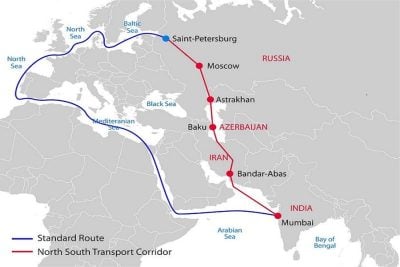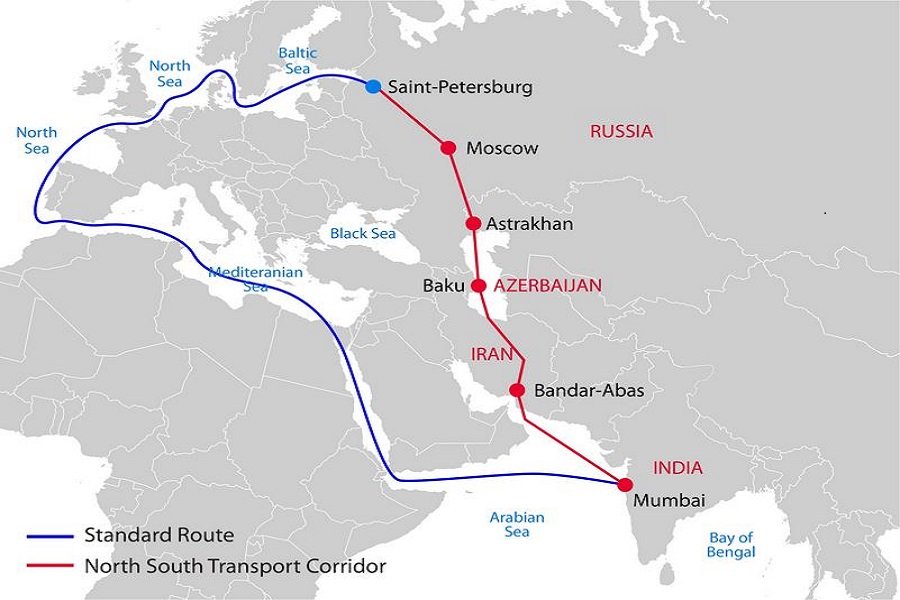Russia, Iran and Azerbaijan Deepen Cooperation to Bypass Western Sanctions
North-South Corridor will make anti-Russia sanctions even more ineffective.

All Global Research articles can be read in 51 languages by activating the “Translate Website” drop down menu on the top banner of our home page (Desktop version).
To receive Global Research’s Daily Newsletter (selected articles), click here.
Follow us on Instagram and Twitter and subscribe to our Telegram Channel. Feel free to repost and share widely Global Research articles.
***
Russia, Iran and Azerbaijan signed a memorandum in Tehran on August 22 to simplify transit routes, improve business relations between the three countries, and develop logistics towards the European continent. The signing of the memorandum is an important step towards the anticipated “North-South” international transport corridor, which offers a shorter alternative to the Suez Canal route. Compared to the sea route through the Suez Canal, the distance is reduced by about two times, which will lower the cost of transportation by about 30% and save time.
The North-South corridor is a multimodal network of maritime, rail and road transport between Russia and India, with a shipping hub in Iran. The corridor is not subject to sanctions imposed against Russia and Iran as the West allows it to rival China’s Belt and Road Initiative. None-the-less, the North-South corridor is not under the influence of Western countries and is a purely Eurasian project.
This corridor will not only be a global artery that further integrates these countries and their economies, but will act as a geopolitical tool to strengthen a multipolar world order. It is predicted that up to 30 million tons of goods will be transported through the corridor every year and will help these countries bypass sanctions.
Source: InfoBrics
The memorandum is important for Russia’s bilateral trade with Azerbaijan and Iran, as well as connecting with Persian Gulf countries, India and even Southeast Asia. With Russia now the most sanctioned country in the world and closed off from European ports for Russian ships, along with the impossibility of obtaining goods from Western Europe, Moscow’s Eastward pivot has been established. In this way, the creation of alternative transport routes is important for Russia’s economic interests.
By signing the memorandum, the three states initiated a process of creating a common corridor for the delivery of various goods and started creating a single logistics and customs window for smooth, stable and fast delivery of goods. This will improve logistics between countries and Russia is anticipated to start receiving South and Southeast Asian products that are much more cost effective compared to their Western counterparts.
For Russia, this is a big project which will bring in billions of dollars in revenues and seriously strengthen its geopolitical position. Given that Azerbaijan has tense relations with Iran and Russia over the situation in Nagorno-Karabakh, the signing of such a memorandum also creates common interests between the three countries, which will have the potential to moderate Baku’s aggressive nature.
Last year, the trade exchange between Russia and Iran increased by more than 81% and reached $4.1 billion; with India it increased by 62.7% and amounted to almost $4.5 billion; and, by 12.1% with Azerbaijan. Although impressive, it is expected that trade exchange will skyrocket with the North-South corridor.
Kremlin spokesman Dmitry Peskov recently stated that Russia and Iran plan to stop using dollars in mutual trade transactions. Commenting on Western sanctions, he pointed out that the two countries have the opportunity to build strong cooperation that will minimize the consequences of sanctions. According to him, Iran has lived under sanctions for a long time but adapted well to this economic difficulty, thus allowing Iranians to live a relatively normal life.
As Russia is increasingly using national currencies in trade with other countries, the addition of a new trade artery allows the financially besieged country to completely bypass the West in transportation and trade, thus rendering sanctions useless. This is despite European leaders demanding their citizens make more sacrifices to their quality of life for the sake of economically attacking Russia with little success.
The US has long used the hegemony of the dollar as the world’s de facto currency to target and sanction countries outside of its control. As the entire world system is changing, the tendency for the value of the dollar as a world currency is gradually weakening.
At the same time though, the West views China as a greater enemy to its dominance in the long-term, and as the BRI comes to more prominence, perhaps Europe will have to begrudgingly accept the North-South corridor as a viable alternative. This remains conjecture for now though, and what is certain is that the corridor will be another step forward in weakening the West’s hegemony over the globe.
*
Note to readers: Please click the share buttons above or below. Follow us on Instagram and Twitter and subscribe to our Telegram Channel. Feel free to repost and share widely Global Research articles.
Ahmed Adel is a Cairo-based geopolitics and political economy researcher.
Featured image is from InfoBrics


